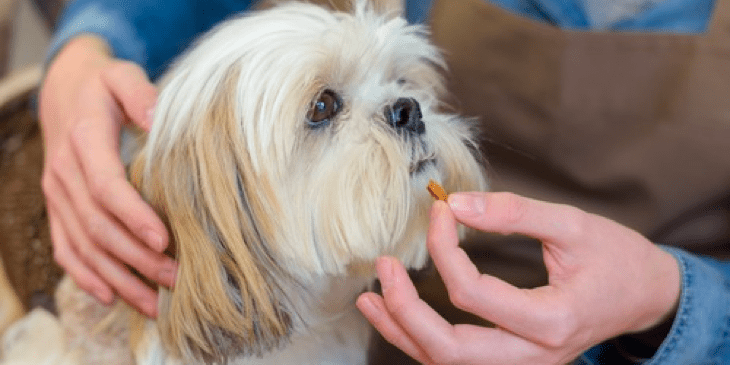Does My Dog Need a Probiotic?

Contents
If your dog has chronic allergy symptoms or digestive issues, he may benefit from a probiotic. Probiotics are beneficial bacteria that reside in the gastrointestinal tract of all animals.
They are essential to your dog’s overall health because they assist in digestion, strengthen the immune system, and defend against pathogens and infections.
Here’s everything you need to know about giving your dog a probiotic.
The Benefits of Probiotics in Dogs
Many of the ailments that affect our pets can be avoided with proper preventive care, such as proper nutrition, plenty of exercise, and essential hygiene.
Giving your dog a probiotic supplement will benefit his overall health and prevent sickness by making his immune system stronger. Giving a probiotic to your dog will provide many of the same benefits you would get from taking one.
The benefits of probiotics in dogs include:
- Boosting the immune system
- Aiding digestion
- Relieving stomach upset and reducing gas
- Regulating behaviors and moods
- Reducing diarrhea and constipation
- Reducing ear and urinary tract infections
- Relieving allergy symptoms, including chronic skin infections
- Assist in maintaining a healthy weight and regulating appetite
- Could reduce or prevent tear staining on white dogs
Do Dogs Need Probiotics?
While it’s true that many remain healthy throughout their lives without probiotics, they could probably benefit from getting them.
For example, even dogs who aren’t sick can have issues like diarrhea, constipation, or excessive gas. One common sign of gastrointestinal discomfort is eating grass when they go outside.
If you have an older dog or a puppy, a probiotic may help prevent illness by strengthening his immune system.
And of course, any dog who is already sick could benefit from a probiotic supplement to help him defend against harmful gut bacteria that may slow down or prevent his recovery.
If your dog has chronic infections, a virus, parasites, or allergies, probiotics will help him fight off sickness. Dogs who have been prescribed antibiotics or other pharmaceuticals that kill off beneficial gut bacteria should also receive probiotics to introduce helpful bacteria back into the gastrointestinal system.
In addition, dogs who are under a lot of stress, such as moving, a change in food, moving, or going to a new home should also receive probiotics to alleviate stomach upset.
Keep in mind that simply giving your dog a probiotic every day won’t cure an underlying health problem. Getting to the bottom of any health issues is essential. If you are concerned about how your dog is feeling, always talk to your veterinarian to see if he might need other medications or treatments.
And, remember that probiotics won’t replace proper nutrition. Be sure to provide the best food possible.
Do Probiotics Have Side Effects in Dogs?

Probiotics are perfectly safe, as long as you don’t overdo it.
If you give too much, your dog may experience nausea, vomiting, or diarrhea.
Side effects are easily prevented by following dosage recommendations on the label or as recommended by your vet. It’s essential to have a balance between the beneficial bacteria and the harmful bacteria in your dog’s gut.
Choosing the Right Probiotic for Your Dog
Although you could probably give your dog the same probiotic you take, it’s better to give one that has been specifically marketed for dogs. As mentioned, proper dosage is very important, and it can vary based on your dog’s age, weight, and overall condition.
Supplements that are made specifically for dogs will include dosage instructions on the label, so there’s no risk of under or overdosing.
Your dog’s vet will also be more familiar with products that are manufactured for canines, so he will be able to provide informed advice when required. And, probiotics that are made for people are usually sold as a pill.
Giving your dog a pill can be a challenge, so manufacturers typically offer supplements for dogs in a flavored chewable or powder form that can be sprinkled right on their food.
You may also wonder why can’t just put a spoonful of yogurt on their food for the probiotics. This is not the best idea for a couple of reasons. First of all, one spoonful of yogurt doesn’t contain enough probiotics to make a real difference.
Second, many dogs can’t digest dairy easily, so it may cause diarrhea or an upset stomach. Definitely not the effect you are going for.
The same goes for other probiotic foods typically meant for humans, like fermented vegetables or kefir. If you decide to try giving them to your pooch, start slowly with tiny amounts to avoid tummy troubles as much as possible.
Other Important Factors of Choosing a Probiotic
Always check expiration dates when purchasing a probiotic. Probiotics are living microorganisms, so products that have been on the shelf for a long time won’t be as effective. At home, you should always store them in a cool place to extend their shelf life.
Look for a supplement that has several different types of good bacteria. Products with a few different strains of probiotics are more effective. You may even want to change up the supplement you give every so often to ensure that your dog is getting a variety of different probiotics.
And, choose a probiotic that has sufficient quantities of probiotics to establish colonies.
The bacteria in probiotics are measured in colony-forming units (CFUs). Be sure to select a probiotic made by a reputable company because the FDA does not enforce claims on probiotics.
In Conclusion
At Puppy Smarts, we understand that your dog is a member of your family. You do everything you can to provide the best care possible. Caring for his gut is essential for preventing many health issues. Probiotics are good for dogs of all ages, so its never too late to add a probiotic supplement to your dog’s daily routine.
